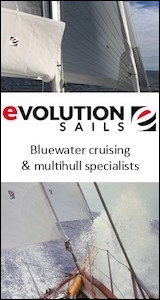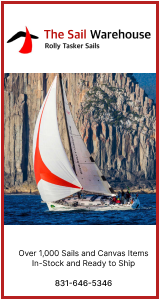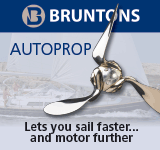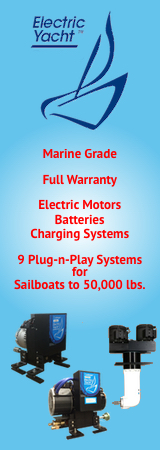Forum Replies Created
-
AuthorPosts
-
 PaulKParticipant
PaulKParticipantSo it could be that some Jaguar 22’s were made with fixed keels and spade rudders. That calls for further research. The chatbot output about MK I and MK II versions is confusing. Where did it get this information? It could be incorrect because online information that is posted (and which the chatbot searches for data) is not vetted. People can post whatever they like – that the moon is made of green cheese, for example – and chatbots will simply add that to their “data”. If enough people post about the moon being made of green cheese, or perhaps simply refer to the idea, the chatbot increases the weight given to that idea and spews it back to you. Garbage In, Garbage Out. On another site someone quoted a chatbot to state that a C&C boat had a cast iron keel. C&C has never used cast iron keels. You have to verify chatbot output yourself.
 PaulKParticipant
PaulKParticipantIs it possible a previous owner had a spade rudder installed on his Jaguar 22 as a custom arrangement?
 PaulKParticipant
PaulKParticipantSeems like it is indeed a Jaguar 22. Look up “Jaguar 22 sailboats for sale” on Google. Different ads with pictures that look exactly like your boat come up. According to the Sailboatdata site the Jaguar 22 is a British-built version of the Catalina 22 with a fin keel. The Catalina 22 was built in swing-keel, fin keel, and winged-keel versions.
March 20, 2025 at 3:29 pm in reply to: Screenwriter looking for appropriate boat to choose for script #91644 PaulKParticipant
PaulKParticipant520 miles at sea is a serious enough distance to call for a serious boat. For a trip like that in the post-apocalypse the seasoned sailors in the crew would probably want something like a Hallberg-Rassy 370 under them. A bigger boat might be more comfortable, but with just three crew boats over 40 feet get difficult to handle. Equipment designed to allow two people to sail a 60′ boat can break, for example. What do they do then? Tired crew make mistakes, and problems snowball – despite Global Warming.
 PaulKParticipant
PaulKParticipantIt does not seem to be any of the designs between 21 and 22 feet long in the Sailboatdata listings. Another picture of the boat from the side, showing the profile and the whole mast and boom might be helpful. If the sail has an insignia on it, that might provide another clue. Did you look for a HIN number? They are usually on the upper starboard side of the transom. HIN numbers were started in the 1970’s, so boats that don’t have them would be before then. They indicate the builder, the design and when they were built. In any case it looks like the first thing to do is to wash the bottom. The growth there is really slowing you down!!
 PaulKParticipant
PaulKParticipantA photo might help people understand the situation you describe better.
 PaulKParticipant
PaulKParticipantIt would help to know the dimensions – LOA, Beam, LWL, and draft. The interior picture makes it look like there may be a centerboard? All these details would be useful in tracking down the model. It looks new enough to have a HIN number – usually on the upper starboard transom. That should give you an answer pretty quickly.
March 7, 2025 at 4:25 pm in reply to: Dimensions of Main Sail for Hunter 2004 386 Furling Sailboat #91574 PaulKParticipant
PaulKParticipantYou could take your existing sail — which you know fits properly, yes? — to a sailmaker and have them measure it. If you’re getting a replacement it will have to come off anyway, no?
 PaulKParticipant
PaulKParticipantнужно искать на сайте Yachtworld, а не здесь.
 PaulKParticipant
PaulKParticipantHave you tried contacting the Y-flyer Class Association? https://www.yflyerclass.org
They seem like a friendly bunch and might be able to help you find out more. Even if she was built out of fiberglass though a boat that old is not likely to still be around. The current sail numbers are in the 2800 range.
 PaulKParticipant
PaulKParticipantBonjour-
The listing here on Sailboatdata shows that Omega 34’s were first built in 1981 so that there should be a HIN number built into the boat. The Sailboatdata listing may have other useful specifications for you as well. The HIN number is probably on the transom, upper starboard side. It will show the date of manufacture. Is the boat currently flagged in the UK or somewhere else? If the English owner registered it elsewhere, that might provide the information you need. If the boat was initially sold to the UK and it stayed registered there, Brexit gets involved and the paper chase gets worse. Bonne chance!
 PaulKParticipant
PaulKParticipantThe drawing here on Sailboatdata makes it look like a solid lump. Your 20 ingots would have to weigh about 50 pounds each to equal the 1000 pounds of ballast indicated for the design. It’s more likely they’re just correcting weights put in to level the boat on her lines while at anchor.
-
This reply was modified 9 months ago by
 PaulK.
PaulK.
 PaulKParticipant
PaulKParticipantReplacing spreaders is usually tricky because of how they attach to the mast. All sorts of different connections by different manufacturers at different times. Making new wooden ones that copy to old ones might be the easiest solution. Barring that, Rig-rite https://www.rigrite.com might have something that works. Talking with a rigger might help too.
 PaulKParticipant
PaulKParticipantYour mechanic (or any marine mechanic) might be a good source for help on this. They’ll have an idea based on the engine hp, displacement of boat, and the sizes of the shaft and aperture. It’s not necessarily a single-answer problem. Propellers of different sizes and pitches might work for what you need.
 PaulKParticipant
PaulKParticipantHIN numbers (Hull Identification Numbers) are usually molded into the hull on the top of the transom on the starboard side, just under the rubrail.
-
This reply was modified 9 months ago by
-
AuthorPosts




